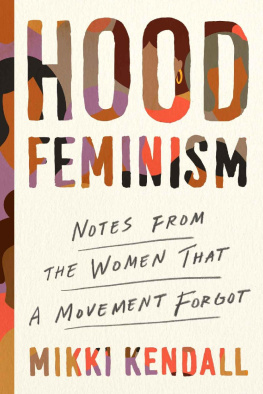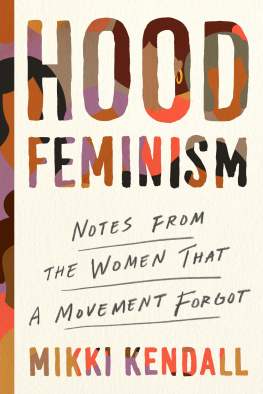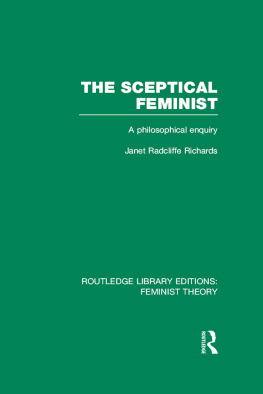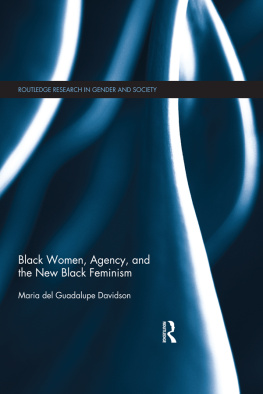Penguin supports copyright. Copyright fuels creativity, encourages diverse voices, promotes free speech, and creates a vibrant culture. Thank you for buying an authorized edition of this book and for complying with copyright laws by not reproducing, scanning, or distributing any part of it in any form without permission. You are supporting writers and allowing Penguin to continue to publish books for every reader.
Names: Kendall, Mikki, author.
Title: Hood feminism : notes from the women that a movement forgot / Mikki Kendall.
Description: New York : Viking, [2020] | Includes bibliographical references.
Identifiers: LCCN 2019033697 (print) | LCCN 2019033698 (ebook) | ISBN 9780525560548 (hardcover) | ISBN 9780525560555 (ebook)
Subjects: LCSH: African American womenSocial conditions. | WomenUnited StatesSocial conditions. | FeminismUnited States. | United StatesRace relations.
Classification: LCC E185.86 .K46 2020 (print) | LCC E185.86 (ebook) | DDC 305.420973dc23
For the hood that gave me the tools. Drexside, the South Side... forever.
INTRODUCTION
My grandmother would not have described herself as a feminist. Born in 1924, after white women won the right to vote, but raised in the height of Jim Crow America, she did not think of white women as allies or sisters. She held firmly to her belief in certain gender roles, and had no patience for debates over whether women should work when that conversation arose after World War II. She always worked, like her foremothers before her, and when my grandfather wanted her to stop working outside their home, and let him be the primary breadwinner, well, that seemed like the most logical thing in the world to her. Because she was tired, and working at home to care for their children was no different to her from working outside the home. To her mind, all women had to work. It was just a question of how much, and where you were doing it. Besides, like a lot of women of that era, she had her own creative and sometimes less than legal ways of making money from home, and she utilized them all as the need arose.
She mandated education for her four daughters, who gave her six grandchildren between them, and for any number of cousins, friends, and neighborhood children around, the mandate was the same. Her answer to almost everything was Go to school. It never occurred to any of us that dropping out was an option, because not only was her wrath to be feared, her wisdom was always respected. High school was mandatory, some college strongly encouraged, and your gender didnt matter a bit. As with work, education was something she believed everyone needed to have, and she didnt much care how you got it, or how far you went, as long as you could take care of you.
My grandmother remainsdespite her futile efforts to make me more ladylikeone of the most feminist women Ive ever had the pleasure of knowing, and yet she would never have carried that label. Because so much of what feminists had to say of her time was laden with racist and classist assumptions about women like her, she focused on what she could control and was openly disdainful of a lot of feminist rhetoric. But she lived her feminism, and her priorities were in line with womanist views on individual and community health.
She taught me that being able to survive, to take care of myself and those I loved, was arguably more important than being concerned with respectability. Feminism as defined by the priorities of white women hinged on the availability of cheap labor in the home from women of color. Going into a white womans kitchen did nothing to help other women. Those jobs had always been available, always paid poorly, always been dangerous. Freedom was not to be found in doing the same labor with a thin veneer of access to opportunities that would most likely never come. A better deal for white women could not be, would not be, the road to freedom for Black women.
She taught me to be critical of any ideology that claimed to know best if those espousing it didnt listen to me about what I wanted, much less needed. She taught me distrust. What progressives who ignore history dont understand is that just like racism is taught, so is distrust. Especially in households like mine, where parents and grandparents who had lived through Jim Crow, COINTELPRO, Reaganomics, and the war on drugs talked to their children early and often about how to stay out of trouble. When the cops harassed you, but didnt bother to actually protect and serve when violence broke out between neighbors, lectures from outsiders on what was wrong with our culture and community werent what was needed. What we needed was the economic and racial privilege we lacked to be put to work to protect us. Being skeptical of those who promise they care but do nothing to help those who are marginalized is a life skill that can serve you well when your identity makes you a target. Theres no magic shield in being middle class that can completely insulate you from the consequences of being in a body thats already been criminalized for existing.
Theres probably some value in being seen as a good girl. In being someone who values fitting in and embracing the status quo. There are rewards, however minor, for those who value being seen as that middle-class model of respectable with no inconvenient rough edges. Ive never found my way there, so I wont pretend to be able to detail the value, or to judge those who can fit into that mold. Ive just accepted that I never will, that Ill probably never even want to cut away the parts of me that protrude in the wrong directions. I like not living up to the expectations of people who dont like me. I enjoy knowing that my choices wont be acceptable to everyone. My feminism doesnt center on those who are comfortable with the status quo because ultimately that road can never lead to equity for girls like me.
When I was a kid I thought there must be some way I could perform being good, perform being ladylike to the point of being safe from sexism, racism, and other violence. After all, my grandmother was so determined to make it stick, it had to mean something. What I discovered was that it offered me absolutely no protection, that people took it as a sign of weakness, and that if I wanted to do more than survive, I had to be able to fight back. Good girls were dainty and quiet and never got their clothes dirty, while bad girls yelled, fought, and could make someone regret hurting them even if they couldnt always stop it. Trying to be good was boring, frustrating, and at times actively hurtful to my own well-being.
Learning to defend myself, to be willing to take the risks of being a bad girl, was a process with a steep learning curve. But like with so many other things, I learned how to stand up even when other people were certain I should be content to sit down. Being good at being bad has been scary, fun, rewarding, and ultimately probably the only path that I was ever meant to walk. I learned that being a problem child meant I could be an adult who went her own way and got things done, because I am not so focused on pleasing other people at my own expense. My grandmother was wise for her time, but not necessarily the best judge of what I needed to do. She embraced middle-class ideas of being ladylike because for her that was a path to relative safety. For me, it just left me unprepared, and I had to learn on the fly from my community how to navigate the world outside the bubble she tried to create for me. I am not ashamed of where I came from; the hood taught me that feminism isnt just academic theory. It isnt a matter of saying the right words at the right time. Feminism is the work that you do, and the people you do it for who matter more than anything else.







